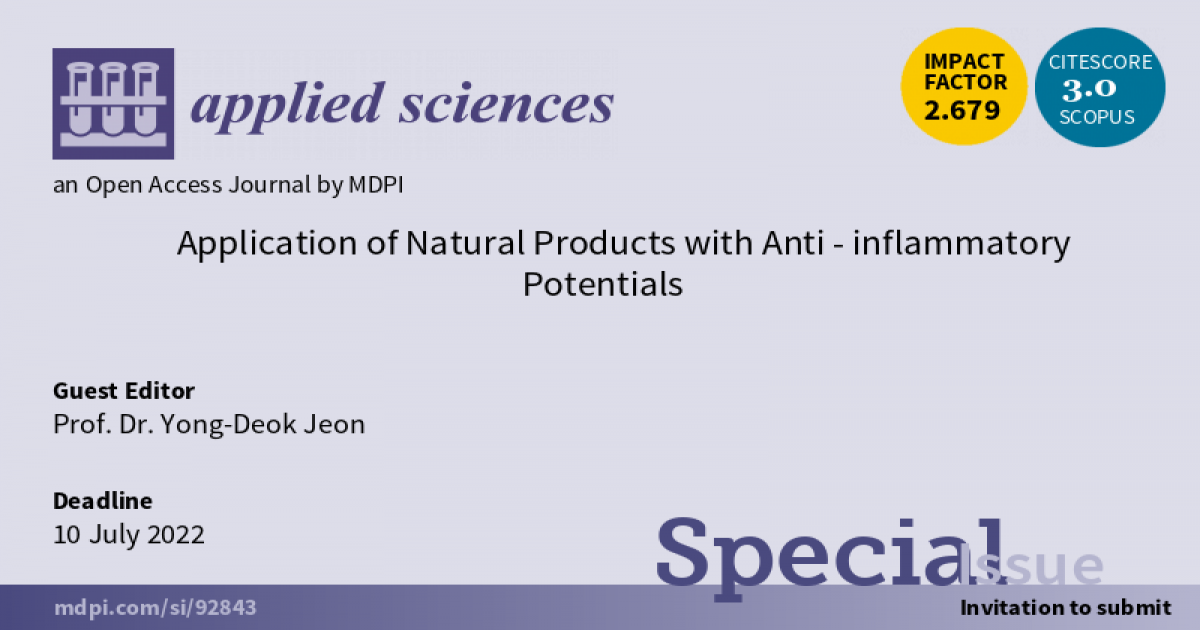Application of Natural Products with Anti-inflammatory Potentials
A special issue of Applied Sciences (ISSN 2076-3417). This special issue belongs to the section "Chemical and Molecular Sciences".
Deadline for manuscript submissions: closed (10 July 2022) | Viewed by 13455

Special Issue Editor
Interests: microbiome; pharmakognosy; pharmacology; natural product; chemistry; colitis; cell biology; inflammation
Special Issues, Collections and Topics in MDPI journals
Special Issue Information
Dear Colleagues,
We are inviting you to a Special Issue called “Application of Natural Product with Anti-inflammatory Potential”.
Natural products are a resource with endless possibilities.
Among the many possibilities of natural products, pharmacological action should be noted.
Moreover, the efficacy of natural products for their anti-inflammatory activity is an area you must explore.
Through this Special Issue, I hope that you will engage in research on anti-inflammatory activity in various natural products and various research fields.
We are ready to humbly accept your field of study.
We hope that many researchers will share their advanced research results through this Special Issue.
Prof. Dr. Yong-Deok Jeon
Guest Editor
Manuscript Submission Information
Manuscripts should be submitted online at www.mdpi.com by registering and logging in to this website. Once you are registered, click here to go to the submission form. Manuscripts can be submitted until the deadline. All submissions that pass pre-check are peer-reviewed. Accepted papers will be published continuously in the journal (as soon as accepted) and will be listed together on the special issue website. Research articles, review articles as well as short communications are invited. For planned papers, a title and short abstract (about 250 words) can be sent to the Editorial Office for assessment.
Submitted manuscripts should not have been published previously, nor be under consideration for publication elsewhere (except conference proceedings papers). All manuscripts are thoroughly refereed through a single-blind peer-review process. A guide for authors and other relevant information for submission of manuscripts is available on the Instructions for Authors page. Applied Sciences is an international peer-reviewed open access semimonthly journal published by MDPI.
Please visit the Instructions for Authors page before submitting a manuscript. The Article Processing Charge (APC) for publication in this open access journal is 2400 CHF (Swiss Francs). Submitted papers should be well formatted and use good English. Authors may use MDPI's English editing service prior to publication or during author revisions.
Keywords
- natural product
- anti-inflammatory activity
- metabolism
- in vitro
- in vivo
Benefits of Publishing in a Special Issue
- Ease of navigation: Grouping papers by topic helps scholars navigate broad scope journals more efficiently.
- Greater discoverability: Special Issues support the reach and impact of scientific research. Articles in Special Issues are more discoverable and cited more frequently.
- Expansion of research network: Special Issues facilitate connections among authors, fostering scientific collaborations.
- External promotion: Articles in Special Issues are often promoted through the journal's social media, increasing their visibility.
- Reprint: MDPI Books provides the opportunity to republish successful Special Issues in book format, both online and in print.
Further information on MDPI's Special Issue policies can be found here.





